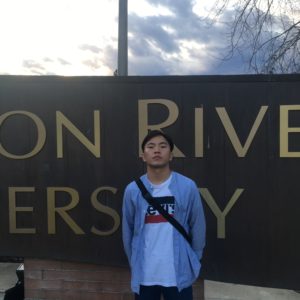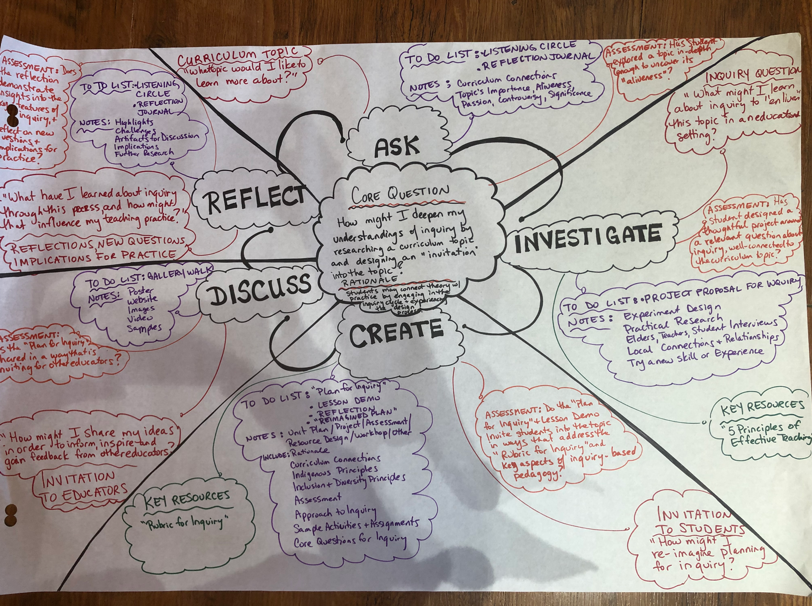Hi, everyone. I am Zhiqiang Liang. This summer semester is my third one at Thompson river university. Through an almost whole year-long journey learning and living in Canada, I acknowledge the completeness of the Canadian education system. When I related it to my domestic educational system, I think several great points can be applied in my country education system. Therefore, I have decided to explore which points are also suitable for the vacancy in China’s educational system. It’s my honor to share my project about Five Aspects of the Canadian Educational System worth China’s Educational system to learn from.

This being a living inquiry, the best place to start it is wherever one finds oneself existentially. One looks inwardly into one’s own thoughts and feelings, while facing the world, noting how one reacts with conditioned thoughts and feeling responses. Usually we are too busy reacting that we do not stop to reflect and examine our response. Inquiry starts at this point of stop. From this place of stop, we question the necessity of “the way things are,” and address the possibility of seeing the world and the self differently and hence relating to the world differently. “What if I were to…?”
—Heesoon Bai, 2005, p. 47

Description: This assignment allows each student to experience the inquiry planning and implementation process. The purpose of this project is to “question the necessity of “the way things are,” [both in the way we teach in schools and in how we interpret the larger world] and address the possibility of seeing the world and the self differently, and hence relating to the world differently. We imagine otherwise possibilities when we ask, “What if I were to…?”” (Heesoon Bai, 2005, p. 47). The project will follow the Inquiry Cycle phases of Ask, Investigate, Create, Discuss and Reflect.
3 replies on “Welcome”
Anson,
It was a pleasure to explore your website!
Stars: This is a very interesting topic and the study findings by Zhu (2019) were interesting to read about.
On phase 1, you have a lot of solid information to back up your topic.
On lesson 1, I love how you broke down the inquiry into ask, investigate, etc. and you clearly demonstrate that you are incorporating the First Peoples Principles of Learning into your lesson.
The videos on your website as well are helpful to explain where you project idea comes from and the BC curriculum.
Wish: I wish that I would get to see more of your lessons and unit plan on the website, as the ones that were presented I found interesting and were valuable lessons. The lessons on the phase 4 appeared to be the same. It would also be useful to take off the ‘description’ parts on the home page and phase 3. 🙂
Question: How could you incorporate lessons about WHY the English language seems to be most dominant in the world?
Your reflection was well thought out, and your expression of inquiry being “complicated” sums it up very well!
Hi Anson,
Thank you for sharing your inquiry project, I found the comparison between the Canadian and Chinese educational systems to be very interesting! I didn’t know that English language learning was such an intensive focus that starts in 1st grade or even earlier. I can recall my language learning experience from grade school, and similarly remember the focus on teacher instruction with few opportunities to share orally. To this day I am okay at writing and reading French, but can hardly speak two sentences.
I really like how you incorporate the students’ interests into the oral component of your lessons. You connect the research based on the foreign exchange students at Shanghai University of Engineering Science who learn language through daily interactions and include it as the basis for your lessons. This makes the learning process not only personal, but practical too.
I wonder if you could tweak your core question so that it might relate to all the lessons in your unit. For example, “How can I effectively communicate a message in English,” and then your focus questions could be what you have already within your lessons (hindering factors, professional presentations, stories to peers, etc…).
Thanks again for sharing, Anson!
Clint
Hi Anson!
Thanks for sharing your lovely lessons and website.
My comments below:
Your words:
Share teacher’s personal memory of college lives.(Share what is the most unforgetable, meaningful and happiness and sorrow)
Then teacher propose today topic is “2 minutes easy presentation of my university life”
My comment:
I think it’s wonderful that you’ve cultivated a personalized learning environment where the teacher shows their own vulnerabilities through story telling. I think hooking the students with a story from their teacher’s experiences in your lesson plan fulfills Friesen’s principle 1 from her framework, where you’ve captured the attention of your students with a story from their teacher’s personal life. Additionally, you’re telling a story about struggle, which is something that any student can relate to from an academic standpoint. You are showing students that it’s okay to struggle and there’s a way to break through that struggle towards something better.
Your words:
They must know how to relax themselves when they are preparing and doing a presentation, and understand how to highlight their key points.
My comments:
I appreciate the importance of teaching students why learning English goes beyond examination requirements and can be looked upon as a welcomed element to fulfill their lives. I found the part of your lesson plan where you encourage students to practice ‘perfect’ presentation skills intriguing from an instructional standpoint.
Perhaps I would suggest this element of your lesson plan could adhere even more to Frisen’s principle 3 – which outlines clear goals for your students. When you suggest students need to learn to ‘relax’ – perhaps giving them some methods to practice and maybe even having an entire lesson dedicated to breathing techniques, story telling when it comes to fears etc and how to relax would be wonderful. I think this would work really well with your lesson and bring another element of story telling, vulnerability and problem solving to your lesson plan – which will bring about further emphasis on the inquiry process.
Your Words:
Learning involves patience and time. Students reflects the awareness that knowledge and understanding is built over time, often requiring a recursive approach to teaching and learning. … Through collaboration group members also learn from each other.
My Comments:
I think the recognition that patience and time is integral to the art of learning showcases how in tune you are with the greater purpose of learning and education, which is to bring about awareness towards oneself and the world. When we respect the learning process by providing individuals with space to explore and question everything, we are also bringing into existence an awareness of learning as a means of becoming more human. I think once we see learning as meaningful to humanity rather than attempting to qualify it as a connection to the material world, we can begin to respect other communities and cultures for what learning they can contribute to our lives. I think Friesen’s principle 4 works well with your empowering beliefs around patience and time with learning. You are creating entrenched ideas about humanization through learning that brings about a deeper element to the culture of learning.